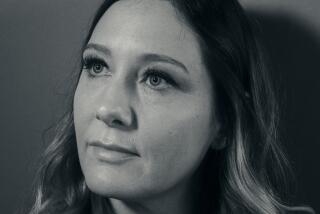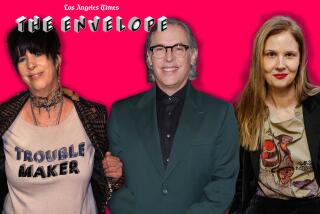‘ER’ Nurse Pulls a Shift as a Film Writer-Director
- Share via
After years of playing a nurse on “ER,” Lily Mariye diagnosed her own surprising condition: She’d developed an itch to direct as well as act.
The desire to go behind the camera hit her in 1998 after Mariye saw a fellow cast member scrutinizing a director at work on the NBC medical drama.
“I said, ‘I want to do that. Since I’m sitting around anyway, I might as well be learning something,’ ” Mariye, who has appeared as nurse Lily Jarvik since the show’s 1994 debut, recalled thinking.
Four years later, she’s the proud writer-director of “The Shangri-la Cafe,” a short film based in part on her Japanese American family’s life in Las Vegas in the late 1950s.
Mariye made the jump to directing through the American Film Institute’s Directing Workshop for Women, founded in 1974 to bring more women into the mostly male ranks of film and TV directors.
Alumna include Randa Haines (“Children of a Lesser God”), Victoria Hochberg (“Sex and the City”) and poet Maya Angelou (“Down in the Delta”).
(After nearly 30 years, the workshop has yet to become superfluous. A recent Directors Guild of America study found that women directed just 11% of episodes for prime-time TV’s top 40 comedies and dramas.)
Mariye had the kind of experience that AFI envisions, said Joe Petricca, vice dean of the AFI Conservatory, which includes the women’s workshop.
“ ‘Shangri-la Cafe’ has been a very successful film for the program. It was shown and won awards at many festivals, and was screened on public television,” on KCET in Los Angeles, he said.
The outcome is more than Mariye expected when she told Lesli Linka Glatter, one of her “ER” director-mentors, about a flier describing the AFI workshop.
“She looked like I hit her on the head with a mallet. She said she had done the program and thought I’d be great for it,” Mariye recounted.
With a 20-page script and letters of recommendation in hand, the actress, who also trained as a singer and dancer, applied for one of the eight spots AFI intends for women already in “media arts.”
That represents a wide range of possibilities, Petricca said, including producers, choreographers, photographers or even “someone who runs a nonprofit arts organization in New Hampshire.”
Among the seven who were selected with Mariye in 1999 from about 200 applicants was, by coincidence, fellow “ER” nurse Yvette Freeman. Her script focused on tensions between black Americans who embrace their African heritage and those who shun it.
For Mariye’s group, the AFI program began with a three-week seminar, traditionally held in spring.
“If you don’t know anything about filmmaking, it’s not enough training to make a short film,” she cautioned. “In my year, we had a couple of film editors, writers, actors and a script supervisor. Everybody had different perspectives on the filmmaking process.”
Mariye’s story was about an Asian American family facing pervasive racism and compelled, in turn, to discriminate against blacks, still subject to segregation in Las Vegas in the late 1950s.
The film was well-reviewed and an award-winner at the Brussels Independent Film Festival and Nashville Independent Film Festival, among others. Mariye is seeking financing to make a theatrical version out of an expanded script.
In the meantime, she’s back for the ninth season of “ER.” Mariye good-naturedly acknowledges the work can be cut-and-dried: “ ‘BP--blood pressure--80 over 60’ is a popular line,” she said with a laugh.
But it’s all part of the creative process, with her work as an actress made more enjoyable by her greater understanding of filmmaking, Mariye said. Besides, she and Freeman don’t check their new skills at the emergency room door.
“We play a game where we stand there and say, ‘All right, how do you think [the director’s] going to shoot this?’ We figure out how we would shoot it and then wait and see what the director does to see if we were right.
“Our directors will catch us and say, ‘Oh, great, two more directors. So, am I doing it right?’ ”
More to Read
Only good movies
Get the Indie Focus newsletter, Mark Olsen's weekly guide to the world of cinema.
You may occasionally receive promotional content from the Los Angeles Times.










